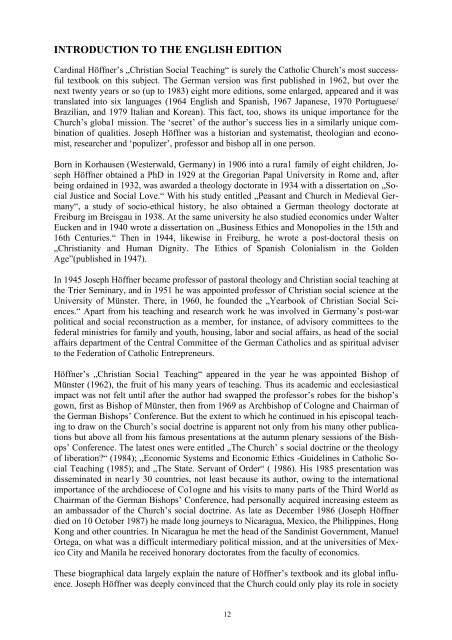Joseph Cardinal Höffner CHRISTIAN SOCIAL ... - Ordo Socialis
Joseph Cardinal Höffner CHRISTIAN SOCIAL ... - Ordo Socialis
Joseph Cardinal Höffner CHRISTIAN SOCIAL ... - Ordo Socialis
Create successful ePaper yourself
Turn your PDF publications into a flip-book with our unique Google optimized e-Paper software.
INTRODUCTION TO THE ENGLISH EDITION<br />
<strong>Cardinal</strong> <strong>Höffner</strong>’s „Christian Social Teaching“ is surely the Catholic Church’s most successful<br />
textbook on this subject. The German version was first published in 1962, but over the<br />
next twenty years or so (up to 1983) eight more editions, some enlarged, appeared and it was<br />
translated into six languages (1964 English and Spanish, 1967 Japanese, 1970 Portuguese/<br />
Brazilian, and 1979 Italian and Korean). This fact, too, shows its unique importance for the<br />
Church’s globa1 mission. The ‘secret’ of the author’s success lies in a similarly unique combination<br />
of qualities. <strong>Joseph</strong> <strong>Höffner</strong> was a historian and systematist, theologian and economist,<br />
researcher and ‘populizer’, professor and bishop all in one person.<br />
Born in Korhausen (Westerwald, Germany) in 1906 into a rura1 family of eight children, <strong>Joseph</strong><br />
<strong>Höffner</strong> obtained a PhD in 1929 at the Gregorian Papal University in Rome and, after<br />
being ordained in 1932, was awarded a theology doctorate in 1934 with a dissertation on „Social<br />
Justice and Social Love.“ With his study entitled „Peasant and Church in Medieval Germany“,<br />
a study of socio-ethical history, he also obtained a German theology doctorate at<br />
Freiburg im Breisgau in 1938. At the same university he also studied economics under Walter<br />
Eucken and in 1940 wrote a dissertation on „Business Ethics and Monopolies in the 15th and<br />
16th Centuries.“ Then in 1944, likewise in Freiburg, he wrote a post-doctoral thesis on<br />
„Christianity and Human Dignity. The Ethics of Spanish Colonialism in the Golden<br />
Age”(published in 1947).<br />
In 1945 <strong>Joseph</strong> <strong>Höffner</strong> became professor of pastoral theology and Christian social teaching at<br />
the Trier Seminary, and in 1951 he was appointed professor of Christian social science at the<br />
University of Münster. There, in 1960, he founded the „Yearbook of Christian Social Sciences.“<br />
Apart from his teaching and research work he was involved in Germany’s post-war<br />
political and social reconstruction as a member, for instance, of advisory committees to the<br />
federal ministries for family and youth, housing, labor and social affairs, as head of the social<br />
affairs department of the Central Committee of the German Catholics and as spiritual adviser<br />
to the Federation of Catholic Entrepreneurs.<br />
<strong>Höffner</strong>’s „Christian Socia1 Teaching“ appeared in the year he was appointed Bishop of<br />
Münster (1962), the fruit of his many years of teaching. Thus its academic and ecclesiastical<br />
impact was not felt until after the author had swapped the professor’s robes for the bishop’s<br />
gown, first as Bishop of Münster, then from 1969 as Archbishop of Cologne and Chairman of<br />
the German Bishops’ Conference. But the extent to which he continued in his episcopal teaching<br />
to draw on the Church’s social doctrine is apparent not only from his many other publications<br />
but above all from his famous presentations at the autumn plenary sessions of the Bishops’<br />
Conference. The latest ones were entitled „The Church’ s social doctrine or the theology<br />
of liberation?“ (1984); „Economic Systems and Economic Ethics -Guidelines in Catholic Social<br />
Teaching (1985); and „The State. Servant of Order“ ( 1986). His 1985 presentation was<br />
disseminated in near1y 30 countries, not least because its author, owing to the international<br />
importance of the archdiocese of Co1ogne and his visits to many parts of the Third World as<br />
Chairman of the German Bishops’ Conference, had personally acquired increasing esteem as<br />
an ambassador of the Church’s social doctrine. As late as December 1986 (<strong>Joseph</strong> <strong>Höffner</strong><br />
died on 10 October 1987) he made long journeys to Nicaragua, Mexico, the Philippines, Hong<br />
Kong and other countries. In Nicaragua he met the head of the Sandinist Government, Manuel<br />
Ortega, on what was a difficult intermediary political mission, and at the universities of Mexico<br />
City and Manila he received honorary doctorates from the faculty of economics.<br />
These biographical data largely explain the nature of <strong>Höffner</strong>’s textbook and its global influence.<br />
<strong>Joseph</strong> <strong>Höffner</strong> was deeply convinced that the Church could only play its role in society<br />
12















